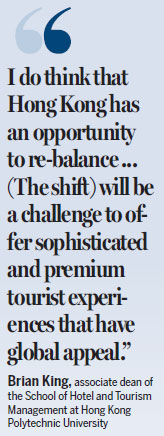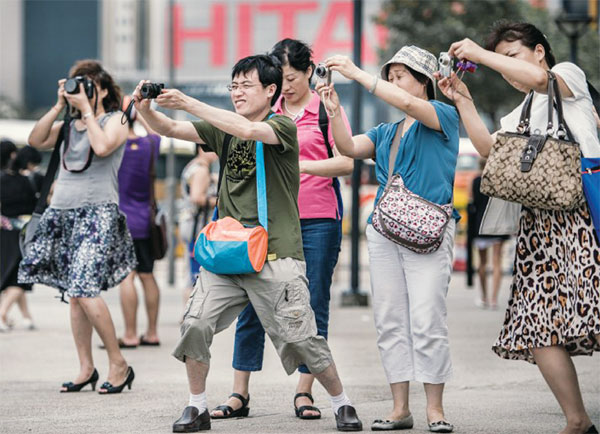Re-balance is key to reversing the tourism downtrend
Updated: 2015-04-22 07:07
By Selena Li in Hong Kong(HK Edition)
|
|||||||
|
Poor tourist experiences have sparked concern over Hong Kong's tourism industry. In the meantime, popular destinations like Japan and South Korea are diluting travelers' interest in the city. Asia News Photo |
Editor's note: Hong Kong is witnessing its worst tourism slump since the 2003 SARS outbreak, aggravated by a drastic drop in the number of visitors from the mainland. Industry experts are adamant that the city must do more to recover the tourist dollars lost by offering more facilities and incentives.
The decline in tourist arrivals, especially the big spenders from the Chinese mainland, in the past several months has raised the question of whether Hong Kong has lost its edge as one of the region's top tourist destinations.
Many hoteliers, caterers, retailers and tourist agents have been blaming disorderly protests, appreciating currency and regional economic downturn for what is alarmingly labeled as the worst tourism slump since the city was gripped by the outbreak of the deadly SARS epidemic.
They are particularly troubled by the decline in the number of mainland visitors who make up almost 80 percent of all tourist arrivals. Tourism industry leaders and economists have lamented Hong Kong's tarnished image as the region's shopping paradise.

But, of course, not everyone comes to Hong Kong to shop. Ask Dahiel Mortiher. Stepping out of a posh hotel in Causeway Bay in a warm afternoon, the 28-year-old flight attendant takes a taxi straight to the swank Soho district for dinner with friends.
"Shopping is the last thing I want to do in my two-day rest in Hong Kong," he said. Instead, he says he'd rather visit the Peak or the Big Buddha statue on Lantau Island. "The shopping districts are just too crowded for me," he adds.
Agrees Desbois Isabelle. "Those malls are too crowded most times," she says. What's more, prices of fashion and most other imported goods aren't attractive compared with those in France, her native country, or even in Tokyo or Seoul, she says. "When you see the price tags, you know they aren't such a good deal," she added.
Apparently, many mainland tourists are beginning to find better bargains elsewhere.
The government plans to mount a five-week promotion campaign to lure tourists back to Hong Kong. In support of the plan, more than 1,000 retailers have pledged to offer big discounts on their ware during the campaign to push sales to tourists and local consumers.
But skeptics doubt if the plan will work with the exchange rate working against it. Hong Kong is also facing intensifying competition from several neighboring cities for tourist dollars.
"The linking of the Hong Kong dollar to the appreciating US dollar has exerted downward pressure on the price competitiveness of Hong Kong's tourism industry," says Brian King, associate dean of the School of Hotel and Tourism Management at Hong Kong Polytechnic University. He adds that, regionally, other cities such as Taipei and Macao, are strengthening their tourism appeal. The depreciation of the yen has led to an outward flow of Hong Kong residents to Japan and South Korea, which have become magnets for tourists in a way never seen before, he says.

Peggy Fang Roe, Marriott's chief sales and marketing officer of Asia Pacific, says that underperforming regional and international currencies have led to a temporary shift in people's shopping and holiday destination preferences.
"I do think that Hong Kong has an opportunity to re-balance. But the shift will be gradual rather than substantial. It will be a challenge to offer sophisticated and premium tourist experiences that have global appeal," King says.
Industry experts agree there is significant potential for further developing the market for meetings, incentive travel, conferences and exhibitions, or MICE, in Hong Kong. "The recent trends in the arrivals dynamics will impact mostly leisure demand, while corporate travelers will remain strong," says Roe of the Marriott. In the first half of 2014, there were some 895,000 overnight MICE visitor arrivals to Hong Kong - up 23.4 percent from a year earlier period.
About 13.8 percent of Hong Kong's 27.8 million overnight visitors in 2014 came for business and meetings, while the percentage in the previous year was only 13.9.
King says he believes that the market can grow again. But for Hong Kong to prosper as Asia's "event city", it will need more active collaboration between all sectors of the industry.
"We expect the MICE market to maintain its booking trend and pace in the years to come," Roe says. "Other factors to consider are the upcoming high-speed train that will begin service in 2017, merging Hong Kong with the Chinese mainland's massive train network," she says.
Al Jamali, a 23-year-old fresh graduate from Dubai, says he can't wait to go visiting Macao and several other cities in Guangdong province this week.
"I will be back to explore this city further," he says. "There are so many things I haven't seen on this short trip."
selena@chinadailyhk.com
(HK Edition 04/22/2015 page9)
